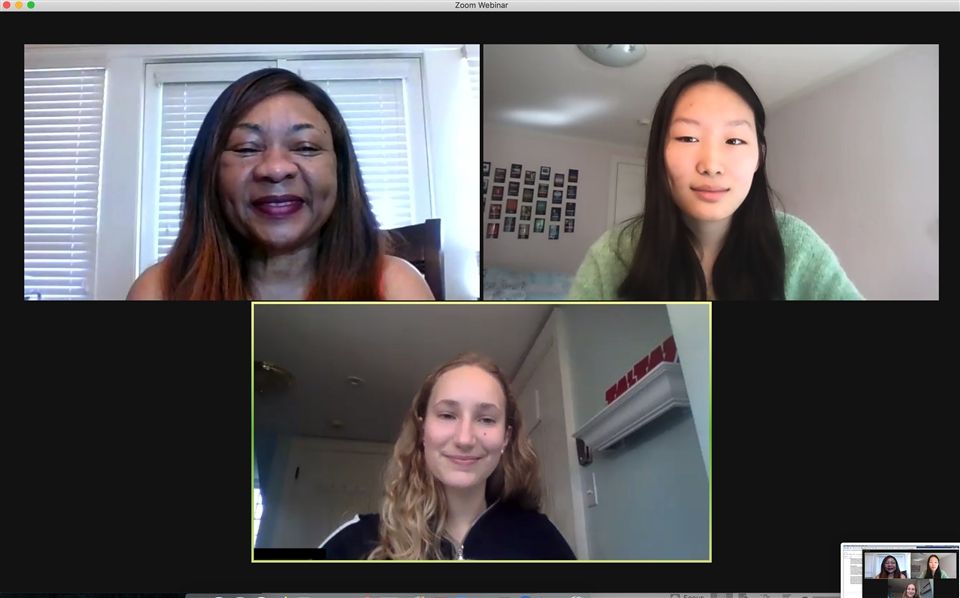On Wednesday, April 14, the student run club Conserve Our World (COW) presented an assembly on environmental justice, featuring internationally recognized advocate for equal water and sanitation Catherine Coleman Flowers. Ms. Flowers was recently appointed to the inaugural
White House Environmental Justice Advisory Council, and she shared her perspective on the pressing issues facing this country today to an audience of Winsor students, faculty, and staff, and a group of environmental student-advocates from Boston Latin.
Timely in advance of Earth Day, the assembly opened with members of COW sharing an overview of the meaning of environmental justice, and highlighting the club’s shift to focus on education and action to bring about change and to hold companies and entities accountable when their practices have a disproportionate, negative impact on the climate and communities. An introduction and video featuring Ms. Flowers followed, setting the stage for remarks from the esteemed advocate and expert.
Thanking the students for bringing attention and clarity to the importance of environmental justice, Ms. Flowers shed light on the critical issue of waste water, and the dire impact it is having on communities where proper set up and treatment systems aren’t in place or are failing. Not surprisingly, the problem disproportionately affects poor communities where people are unable to afford the costs associated with alternatives, and Ms. Flowers has spent the past two decades as an activist for the issue, raising awareness and advocating for those who are unable to advocate for themselves.
Thanks to her tireless efforts, and the work of other advocates who share her passion, the stark circumstances of one family in one rural community captured national attention, helping make it increasingly difficult for leaders and policy makers to ignore how disproportionately impacted impoverished communities are by waste and other climate issues. Last year, Ms. Flowers was asked to join the Biden-Sanders Climate Unity Taskforce to help draft policies on how to deal with climate change with a strong focus on environmental justice. The work was taking place against the back drop of the Black Lives Matter movement, and the COVID-19 pandemic, all which served to further underscore the intersectionality between worsening environmental issues in vulnerable communities and a growing health crisis.
Continuing her work as part of the
White House Environmental Justice Advisory Council, Ms. Flowers says the key to real change at the federal level will be to hold polluters responsible for the health consequences they’ve created, and to secure the funding needed to put the proper infrastructure in place. Dedicated to the work, she encouraged students to learn “the art of listening” in order to be get involved most effectively. “Learning community engagement is one of the hardest things to do. People want to help, and they don’t know how. I tell them to go in and listen.” And when students asked how to contribute, she suggested looking first within their own communities, following the lead of young activists like Greta Thunberg, internships, and writing to those who can drive change. “Writing a great way to contribute before you are able to vote because it influences policy.”
About the speaker:Catherine Coleman Flowers founded CREEJ (the Center for Rural Enterprise and Environmental Justice), serves as the Rural Development Manager for the Equal Justice Initiative (EJI), and is a Senior Fellow for the Center for Earth Ethics at Union Theological Seminary. She is a 2020 MacArthur Fellow in Environmental Health and served on the Biden-Sanders Unity Climate Task Force to inform policy making discussions in preparation for the 2020 presidential election. Ms. Flowers was recently appointed to the inaugural White House Environmental Justice Advisory Council. From each of these roles, she brings a lens of leadership and authority on environmental justice and climate change to her talks. Her book Waste: One Woman’s Fight Against America’s Dirty Secret, was added to the New York Times “16 New Books To Watch For In November” list for its discussion on where sanitation meets systemic race, class, and geographic prejudice.
The assembly was made possible by the Social Justice Fund and Stone Foundation






